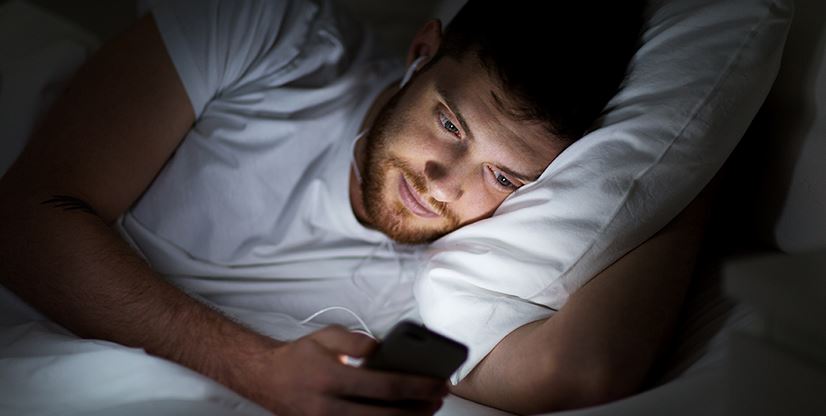Too Wired to Be Tired
- Category: News, Primary Care, Men's Health
- Posted On:

In the couple hours leading up to bedtime, it’s finally your time. If you’re able to turn off your work switch and leave the rest of those emails for the office tomorrow, you might head to the couch to catch up on your favorite shows. Maybe you scroll through your phone, surf the web on your laptop or read an e-book on your tablet.
For most Americans, our digital devices are now such a big part of our day that it’s hard to put them down at night. However, ending your day with technology may in fact be keeping you too wired to sleep.
Why Electronic Gadgets Keep You Awake
Given that the average person spends over 10 hours a day looking at some type of electronic screen, everyone needs a break from technology — and this is especially true at bedtime. Watching TV or using your phone is not as relaxing as you think. Electronic gadgets keep you awake due to:
- Blue Light — You probably don’t notice it, but the artificial “blue light” that comes off your screen — whether it’s a TV, cell phone or tablet — throws off your built-in sleep/wake cycle, also known as your circadian rhythm. The bottom line is that your body naturally wants to sleep when it’s dark and be awake when it’s light. Even small electronic devices can send out enough light to delay the release of your body’s sleep-inducing hormone, known as melatonin, and keep you awake longer.
- Brain Stimulation — One of the most basic but important reasons that technology affects our sleep is cognitive stimulation. When you watch a TV show you enjoy or play a game on your phone, it’s normal to get engaged with it — which can trigger surges of adrenaline, especially if it’s exciting or suspenseful. As your brain revs up, electrical activity increases and neurons fire, the exact opposite of what should be happening before sleep. This can even happen just by reading your social media, texts and emails before bedtime. Whether those messages are making you happy and excited or anxious and frustrated, these feelings and their accompanying symptoms don’t always turn off with your device when you want to go to sleep.
- Disruptive Noises — Many people have a TV in their bedroom that stays on when they drift off to sleep, or a cell phone they keep on their nightstand. Unlike constant “white noise,” such as a quiet fan, the sounds of a TV change in volume, tone and pace. And your cell phone emits sporadic alerts or vibrations. Your brain is conditioned to register and process these sounds while you’re sleeping, so this variation can briefly disturb the continuity of your sleep even if you don’t realize it at the time. Ideally, the sounds you sleep to should be the same from the time you drift off to when you wake up in the morning.
Tips for Powering Down at Night
Making a few adjustments in your nighttime routine can make all the difference in your sleep quality. Here are some technology-related tips to improve your sleep quality:
- Avoid electronic devices an hour before bedtime. Ideally, it’s best to power down your devices at least two or three hours before you go to bed. If this just isn’t possible, try starting with just 30 minutes and gradually work your way back to one hour before bed. Then continue to increase this tech-free time as much as you can. Instead of an e-reader, read a real book instead.
- Keep your bedroom a tech-free zone. This includes removing the TV and your cell phone. If you need to charge your phone, leave it on the kitchen counter instead of at your bedside within reach. For optimal sleeping conditions, your bedroom should be quiet, dark and cool.
- Go to bed before you fall asleep on the couch. Do you have a habit of watching TV on the couch until you doze off, and then heading to bed around 2 am? Try going to bed before that happens — or as soon as you realize you are dozing. You will find yourself much more rested after getting a full night’s sleep in the quiet comfort of your room.
- Stick to the same bedtime. Going to bed at the same time every night helps your circadian rhythm stay on track. As tempting as it may be to watch “just one more episode” while binging on Netflix, remind yourself how you will feel in the morning when you have to get up for work.
- Don’t forget to “disconnect” kids too. While many children use devices to “soothe and relax” before bed, technology has just as much, if not more, impact on your kids’ sleep as it does on yours. Children who use electronics before bed tend to have later bedtimes and get fewer hours of sleep, making them more prone to daytime drowsiness. Teenagers are especially vulnerable, since they’re using devices for homework as well as a primary social connection. Encourage your kids to instead read a book (on paper) to unwind. And remember, you’re a role model for them in how you use (or don’t use) technology at night.
Being tired is not anything to take lightly or to try to “tough out,” as some sleep conditions, such as sleep apnea, can pose serious health problems. If need be, your doctor can connect you with a Sleep Specialist at Sauk Prairie Healthcare.
References:
- https://www.sleep.org/articles/technology-impacts-sleep-satisfaction/
- https://www.sleepassociation.org/blog-post/sleep-and-electronics/
- https://www.sleep.org/articles/circadian-rhythm-body-clock/
- https://www.sleep.org/articles/ways-technology-affects-sleep/
- https://www.webmd.com/sleep-disorders/features/power-down-better-sleep#1
